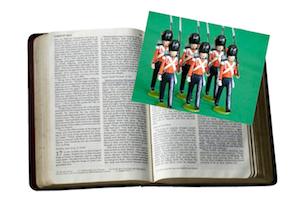 Yesterday we surveyed the New Testament with non-pacifist eyes. Today we’ll put our other lenses on.
Yesterday we surveyed the New Testament with non-pacifist eyes. Today we’ll put our other lenses on.
What are some of the passages typically used by pacifists? Here are a few that come to mind:
- The Sermon on the Mount. If Romans 13 is the trump card for their opponents, the Sermon on the Mount is the Ace of Spades for pacifists. Sayings like “Do not resist an evil man,” “Turn the other cheek,” and “Love your enemy” seem to support the pacifistic view.
- Luke 22:38. Where many non-pacifists find encouragement in Jesus’ mention of buying swords in Luke 22, pacifists point to his sharp response when the disciples produce two swords. Pacifists take “That is enough” as a rebuke of the disciples’ misunderstanding of Jesus’ words.
- Jesus’ rebuke of Peter in Gethsemane. When Peter drew a sword to defend Jesus, Jesus sharply rebuked him. Matthew records this:
“Put your sword back in its place,” Jesus said to him, “for all who draw the sword will die by the sword.” (Matthew 26:52)
- Jesus’ reply to Pilate about His kingdom:
“My kingdom is not of this world. If it were, my servants would fight to prevent my arrest by the Jews. But now my kingdom is from another place.” (John 18:36)
Pacifists argue that Jesus’ kingdom is still other worldly, so fighting is inappropriate.
- Paul’s teachings in Romans 12:14-21 about avoiding vengeance, not repaying evil with evil, and living at peace.
- The Book of Revelation. The message of Revelation, directed to an oppressed church, was one of submission and patience, not uprising and rebellion. The wicked would be punished, but not at the hands of the righteous.
Those are the primary passages that come to mind. Lots of reasoning can be done apart from these passages, both in favor of and against pacifism, but I think these are the texts that are normally referenced.
I plan to do some analysis of all of this beginning next week. For now, I want to feel that we’ve done a proper survey. So please point out any texts that have been missed along the way.
